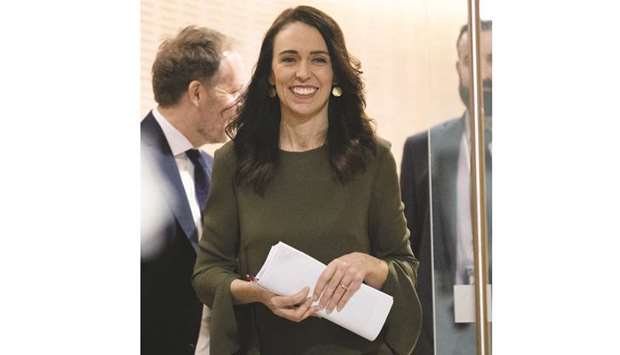Prime Minister Jacinda Ardern yesterday delayed New Zealand’s looming election by four weeks to October 17 after a renewed coronavirus outbreak hampered campaigning.
Ardern was under pressure from political opponents and her coalition partners to shift the original September 19 vote following the shock discovery of Covid-19 in Auckland last week, sending the country’s largest city into lockdown.
She said the return of the virus after 102 days without community transmission had rattled Kiwis and could have discouraged some from casting ballots in a September election. The centre-left leader, who is riding high in opinion polls, also acknowledged concerns from rivals that curbs on campaigning would unfairly weigh the election in favour of her government.
After spending the weekend consulting party leaders and the Electoral Commission, she chose October 17, the earliest delayed date available to her. Ardern said the change meant all parties would be campaigning under the same conditions and she would not move the election’s timing again regardless of the situation. “I have absolutely no intention at all to change from this point,” she said. “This decision gives all parties time over the next nine weeks to campaign and the Electoral Commission enough time to ensure an election can go ahead.”
All parties temporarily suspended campaigning in the wake of last week’s outbreak, the source of which remains unknown.
The virus was first detected in four family members in Auckland early last week and by Monday the cluster had grown to 58 confirmed cases, with five people in hospital. The South Pacific nation is following the same strategy that helped contain coronavirus during a seven-week lockdown earlier this year — isolating positive cases, contact tracing and extensive testing.
The earlier success has helped lift Ardern’s personal popularity rating to a record 60%, along with her leadership during last year’s Christchurch mosque attacks and the White Island volcano eruption.
Ardern’s Labour Party is on track to win office in its own right, without the minor party coalition partners — the Greens and New Zealand First (NZF) — it needed during its first term.
The main opposition National Party last week demanded the election be postponed until late November, or preferably next year, saying September 19 was untenable. Ardern’s coalition partner NZF backed the delay yesterday after earlier saying the September option had been “fatally compromised” by the outbreak.
“Common sense has prevailed,” said NZF leader and Deputy Prime Minister Winston Peters, whose populist party faces an election wipeout on current polling.
Labour’s other coalition partner, the Greens, said the four-week delay should give health authorities time to contain the Auckland cluster. But co-leader James Shaw accused some parties of displaying “naked political self-interest” in demanding a delay, saying they hoped the pandemic’s economic impact would dent the government’s popularity in the meantime. “We have been incredibly disappointed to see the National and other small parties continue to use the weekend to bang on about what would suit them best politically,” he said.
The virus is a strain not previously seen in New Zealand and national health director-general Ashley Bloomfield said tests to check if it was imported via freight sent to an Auckland coolroom facility were still being processed. But he assured the public there was no risk in purchasing frozen goods from the supermarket. “There’s no evidence of transmission by food or food packaging to date,” he said, adding that some form of human-to-human infection was still considered the most likely source of the outbreak.

Prime Minister of New Zealand Jacinda Ardern arrives at a press conference to speak to media about changing the 2020 general election date at the Parliament in Wellington yesterday.
